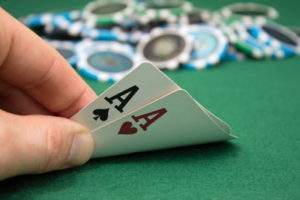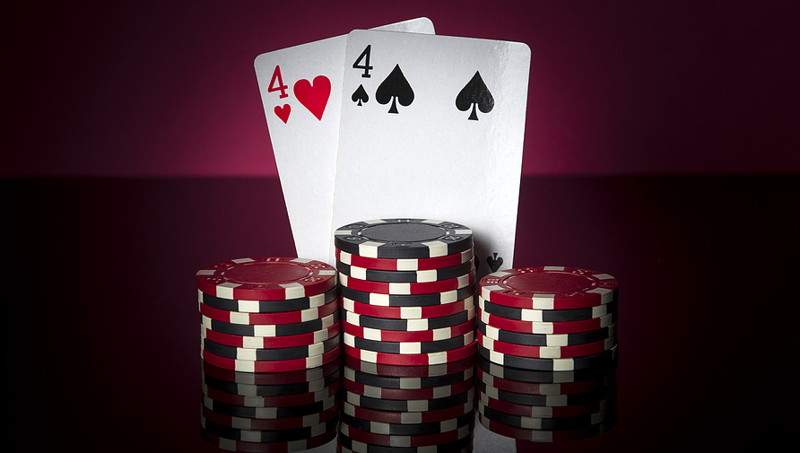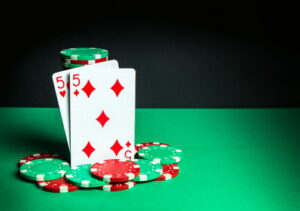 Being dealt a pocket pair in Hold’em poker opens various possibilities for improving it by the river to a set or quads. Even another pair on the board might be enough for you to win with two pairs.
Being dealt a pocket pair in Hold’em poker opens various possibilities for improving it by the river to a set or quads. Even another pair on the board might be enough for you to win with two pairs.
Of course, not every pair is considered a good starting hand. The top 20 rank of the starting hands includes at most a pair of eights.
When you are dealt a pair, the first question coming into your mind is whether one or more of your opponents were dealt a pair, too. But you may ask yourself another question: How likely is that an opponent was dealt the same pair as yours? Or, in general, what are the odds of two players being dealt the same pair? They are in the category of very low Hold’em odds, but let’s see precisely what these odds are.
Chance Of An Opponent Getting The Same Pair

Let’s first consider these odds from the perspective of your hand, that is, by using the information given by your own pocket cards.
Before doing the calculation, it is worth saying that being dealt a pocket pair does not reduce the chances of your opponents having a pocket pair, but on the contrary, it increases them. It may seem counterintuitive, but this is the case.
It is not like having a hat with all the possible pairs, you draw one out and as such there are less remaining in the hat. Combinatorial probability works differently. Without going into the math of this probability, a brief explanation would be this: Your pair decreases for your opponents the number of paired combinations (with one) much less than it decreases the number of unpaired combinations holding one card of that rank.
The probability of being dealt a pocket pair (any) is 5.88%. Once you have been dealt a pair, the probability that one specific opponent is dealt the same pair is 1/C(50,2) = 1/1225.
Since only one opponent can be dealt that pair, the probability for at least one opponent being dealt the same pair as yours is n/1225, where n is the number of your opponents.
That generates the following odds table:
| No. of opponents | Probability that at least one opponent is dealt the same pair as yours |
|---|---|
| 1 | 0.00081 (1/1225) |
| 2 | 0.00163 (1/613) |
| 3 | 0.00244 (1/409) |
| 4 | 0.00326 (1/306) |
| 5 | 0.00408 (1/244) |
| 6 | 0.00489 (1/204) |
| 7 | 0.00571 (1/174) |
| 8 | 0.00653 (1/152) |
| 9 | 0.00734 (1/135) |
The highest value is attained at a full table, namely 0.73% or 1 in 135 chance, which is still very low.
Odds For Any Two Players Being Dealt The Same Pair
 If we talk about any two players holding the same pair, we should compute the odds of that from a neutral perspective, that is, from the perspective of an observer who is not a player and does not see any of the cards dealt.
If we talk about any two players holding the same pair, we should compute the odds of that from a neutral perspective, that is, from the perspective of an observer who is not a player and does not see any of the cards dealt.
The probability for two specific players at a table being dealt a specific pair (say, of jacks) is (1/C(50,2)) x (1/C(48,2)) = 1/1.381.800. We have 13 ranks for the cards, so the probability of those players being dealt the same pair of any rank is 13/1.381.800.
Assume a full table. There are C(10,2) = 45 ways of choosing two players out of 10, so we have to multiply the last probability with 45 to get closer to the probability of at least two players at a full table to be dealt the same pair: 585/1.381.800 = 0.042% or 1/2380.
This is an accurate enough approximation since the probability of two pairs of players being dealt the same pair of cards each (xx xx yy yy) is about 0.00000167, which can be ignored in the computation.
Obviously, the less players on the table the less the computed probability. Hence the maximal probability for any two players holding the same pair is 0.042% for a full table.
Among all Hold’em odds, some are so low that do not count in any strategic evaluation. Still, those improbable events actually do happen sometimes; their probability is not zero.
In preflop, when two players raise many times against each other we could think of them having been dealt the same high pair, such as aces or kings, against the odds.
Anyway, this situation would be disadvantageous for both players holding the same pair, even aces, just because they cannot use any community cards to improve their pair, while the other players holding pairs might use them.
About The Author
The author of this page is Dr. Catalin Barboianu. Catalin is a mathematician specialising in gaming and responsible gambling and a research associate at the University of Bucharest.
